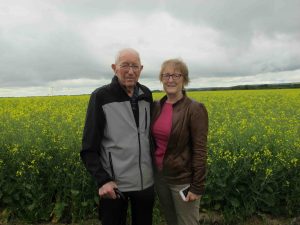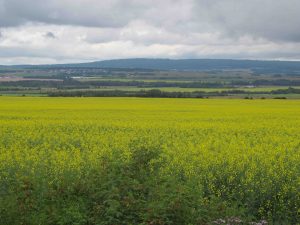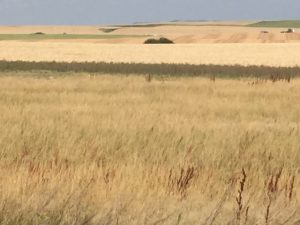Taking the Trip of a Lifetime—by Train, Plane, and Motorcycle
by Liz Jansen

Looking at the same scenery during the trip of a lifetime, three generations had differing views. Flying north from Edmonton to Grande Prairie, my father stared out at the wilderness below. He was fixated on the fish and wildlife that called it home. Ninety-one years ago, his father had watched as the train clickety-clacked through these forests. He was headed to his new home in a new country. Last year, I’d ridden my motorcycle across the same terrain on a trip tracing my ancestors’ migrations through the west.
Knowing my father, who was born in Alberta, had always yearned to return to the prairies, and knowing how much last year’s trip meant to me, I offered to accompany him to the places he’d lived as a child. He’s in pretty good health for his 91 years, but frail. He thought about it only briefly before jumping at the chance—metaphorically speaking.
Aside from paying homage to his parents, my grandparents, I was hoping it would trigger memories and stories I hadn’t heard.
Even as the flight was taking him back to his infancy, I was delighted to hear his inner child speaking, a voice I’d rarely heard.
“I wonder what it would be like to land on one of those clouds,” he mused as we flew high above them.

Not surprisingly, he had no memories of his home in Beaverlodge, in Alberta’s northern Peace River country. After all, his father died before he was two and his mother moved south with their toddler. His only recollection from that time was his mother lying in bed, holding him, crying. Still, his affinity for the area’s open farmland was definite. And it strengthened as we moved south.
By the time we arrived at the farm southeast of Calgary where he lived between ages 4 and 11 after his mother remarried, his countenance spoke volumes, even if words were scarce.
In 1925, an eight-square-mile tract of land known as Namaka Farm was neatly partitioned into quarter-section (160 acre) farms. Thirty-six immigrant Mennonite families (100 people), including dad’s stepfather, settled here.
As I gazed over unending fields of grain, I tried to imagine the community that existed here in his time. Each farm had a log house, barns, and granaries, all long since razed. There’d be pigs fattening up and cows for milking. A variety of horses used to work the land, pull the wagons, or ride for transport, hung around the barnyard. There was the schoolhouse where dad learned English, down the road just south of the railway tracks. All that was left was the grove of poplars that shaded it.
It took his family seven years to concede they couldn’t survive on the proceeds of 160 acres, even in the absence of drought and dust storms. But in the mean time, it was a vibrant community with lots of visiting between families, children getting together to play, and regular church services.

The prairie years set the stage for the rest of my father’s life. Out of necessity, he learned how to be frugal and stoic. It’s how he cared for his mother and younger siblings, and later raised his own family and successfully managed his fruit farm.
Those qualities pervaded his life—how he responded to hardship, handled his finances, and eked out his emotions. They were physical, emotional, and spiritual survival techniques he learned from his parents, and passed on to his children.
How that played out is a story for another time. Understanding the lives of my ancestors, the times they lived in, and how they managed helps me understand how their experiences and beliefs shaped me. It changes my perspective on their lives and mine. Most of all, it allows me to be the author of my story, rather than living from a script.
Thank you dad!
Have you had similar experiences? Share them in the comments.

Loved read this Liz.
Thanks Pamela! It was a gift to have that week.